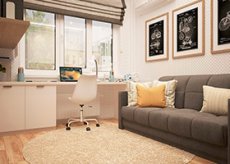New publications
Poor lighting hampers the learning process
Last reviewed: 02.07.2025

All iLive content is medically reviewed or fact checked to ensure as much factual accuracy as possible.
We have strict sourcing guidelines and only link to reputable media sites, academic research institutions and, whenever possible, medically peer reviewed studies. Note that the numbers in parentheses ([1], [2], etc.) are clickable links to these studies.
If you feel that any of our content is inaccurate, out-of-date, or otherwise questionable, please select it and press Ctrl + Enter.

In low light conditions, nerve cells have poor contact with each other, which leads to a deterioration in memory processes.
To optimize memory, the brain needs bright light. This was stated by scientific representatives of the University of Michigan. They conducted a series of experiments on grass rodents: the animals were divided into groups and kept in a room with different levels of illumination for a month: from simulating a cloudy day to normal daylight or artificial light. It is worth noting that grass rodents lead a predominantly diurnal lifestyle, just like humans.
A month later, the researchers discovered that the rodents that were always in dim light had problems with the hippocampus, one of the basic centers of memory and spatial orientation. As the authors of the study explained, the lack of light caused a 30% reduction in the capacity of the hippocampus. As a result, connections between nerve cells were poorly formed, and the rodents themselves began to have poor orientation in the area.
The deterioration of the formation of mutual contacts of neurons may be related to the decrease in the content of protein in the brain, which is called the neurotrophic brain factor. This factor activates the processes of growth and development in neurons, allows them to create and strengthen synapses. With a deficiency of the neurotrophic factor, the formation of new chains of neurons is disrupted. As a result, the process of memorizing new information worsens, the quality of learning suffers.
However, scientists also noticed a positive aspect: all the disturbances were transient. If the rodents were given higher levels of lighting, their ability to remember and navigate in space was restored, and the function of the hippocampus was stabilized.
Of course, a couple of studies on rodents are not enough to obtain reliable information. More experiments with people are needed. It would not be superfluous to obtain information about whether other cognitive properties suffer with prolonged lack of light.
Of course, it is difficult to imagine that there are people who spend several weeks in a row in darkened rooms. But it cannot be ruled out: many have to work daily in poorly lit offices, workshops or rooms. Also, there may be a lack of light in classrooms - especially if the rooms are located on the lower floors.
Experts believe that dim lighting in any case negatively affects brain activity - to a lesser or greater extent. By the way, previous experiments have already shown that with a lack of sunlight, a person's metabolic processes slow down, which can negatively affect health - in particular, lead to obesity.
Details of the study are presented in the publication Hippocampus.

 [
[